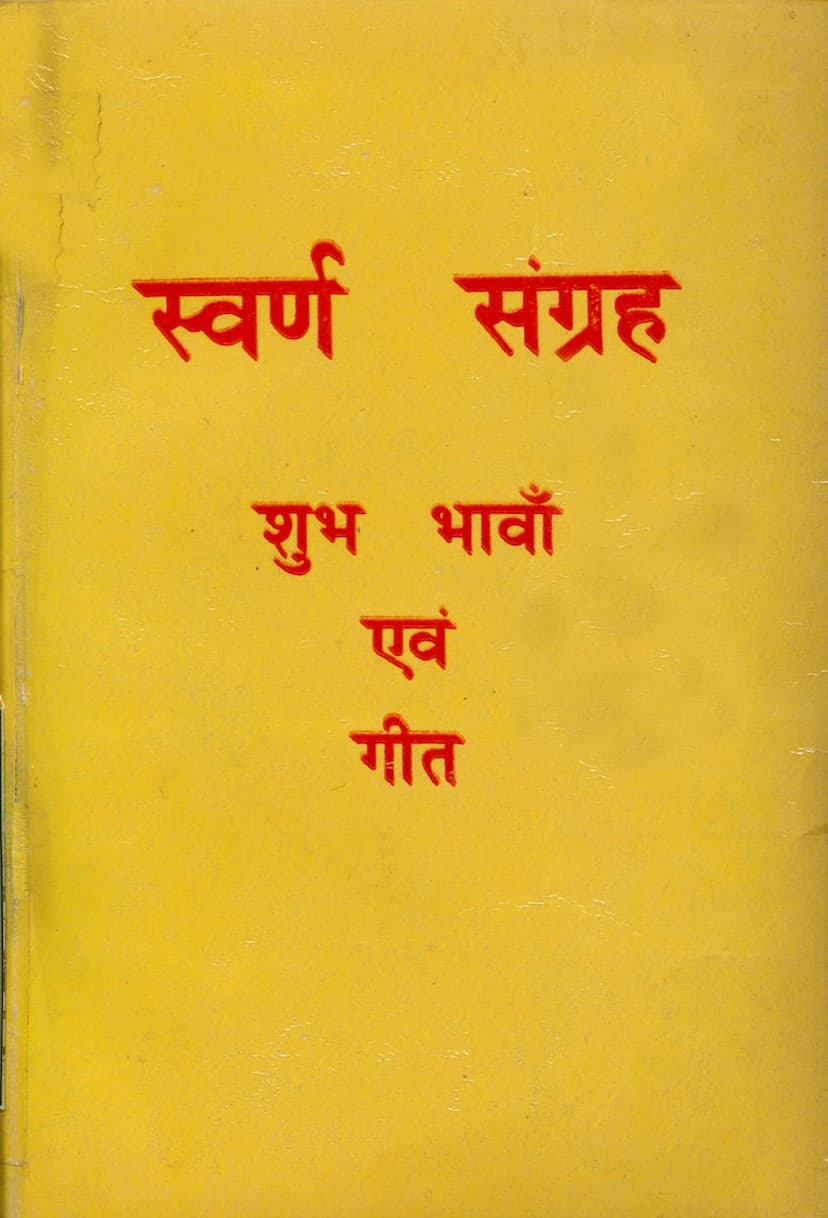Swarna Sangraha
Added to library: September 2, 2025

Summary
Here's a comprehensive summary of the Jain text "Swarna Sangraha" (Golden Collection) by Amolakrushi Maharaj, based on the provided pages:
Overview:
"Swarna Sangraha" is a collection of devotional songs, hymns, and instructional verses primarily focused on Jain principles, the lives of the Tirthankaras, and ethical guidance for married life and societal conduct. The book appears to be a compilation of devotional and educational material intended for spiritual upliftment and adherence to Jain values. It is presented as a gift in honor of "Varshi Tap" (a specific type of Jain austerity).
Key Themes and Content:
-
Lives and Lineages of Tirthankaras:
- A significant portion of the text is dedicated to listing the parents and birthplaces of the 24 Tirthankaras (Pages 6-8, 40-42). This is done in a song-like format, likely for memorization and remembrance.
- The birth of each Tirthankara is celebrated through various poetic forms, emphasizing their divine nature and auspicious arrival.
-
The Fourteen Dreams:
- The book details the fourteen auspicious dreams experienced by Trishala Devi, the mother of Lord Mahavir, and other Tirthankara mothers (Pages 8-9, 20-21, 37-38, 43-44).
- The dreams are described in vivid detail, and their interpretations foretelling the birth of Tirthankaras and Chakravartis are presented, highlighting the divine destiny of these souls.
-
Devotional Songs and Hymns:
- The text is filled with numerous songs set to traditional tunes ("tarj"). These songs express devotion, praise, and often narrate specific events or qualities related to Tirthankaras and Jain figures.
- Songs like "Hathni" (Elephant), "Jhala" (Tambourine), "Tara" (Star), "Deepak" (Lamp), and "Suraj" (Sun) are used to personify and remember various Tirthankaras and their virtues, associating them with specific symbols and locations.
- The recurring themes in these songs include:
- Parentage and Birthplaces: Repeatedly mentioning the parents and cities associated with Tirthankaras.
- Virtues and Miracles: Highlighting their spiritual achievements, peace-bringing nature, compassion, and overcoming obstacles.
- Celebrations: Describing the divine celebrations (like the "Athai Mahotsav") that accompany the birth and spiritual awakening of Tirthankaras.
-
Ethical and Social Guidance:
- The book offers practical advice for married life, emphasizing good conduct, mutual respect, and spiritual growth within the household.
- There are sections with songs like "Veera" and "Rajul Ri Chundadi" (Rajul's Veil) that seem to focus on relationships, familial duties, and the importance of righteous living.
- Songs related to wedding rituals like "Kankon Dora Kholne ka Geet" (Song for opening the Kankon thread), "Tel Lagane ka Geet" (Oil-anointing song), "Mehendi" (Henna), and "Haldi" (Turmeric) are included, guiding conduct during ceremonies.
- There are songs that strongly advocate for Swadeshi (indigenous products) and the use of Khadi, reflecting a patriotic and self-reliant spirit (Pages 76, 104-105). This suggests the book might also carry social reform messages.
-
Emphasis on Knowledge and Learning:
- Songs like "Chauvis i" (The Twenty-Four) are presented as ways to remember and pay homage to all Tirthankaras.
- There's an emphasis on acquiring knowledge, as seen in the "Bana" songs encouraging education and understanding.
-
Specific Characters and Narratives:
- Gautam Swami: Mentioned as a disciple, often alongside Tirthankaras, indicating his importance as a learned figure.
- Rajul: Her story, particularly her renunciation and spiritual path, is alluded to in songs like "Rajul Ri Chundadi" and "Rajul Ki Mehdi," highlighting her devotion and detachment.
- Vach Raja: A narrative sequence about Vach Raja and his interactions with a snake charmer (Pages 53-60) is included, possibly as a moral tale about righteousness and the consequences of one's actions.
-
Rituals and Devotional Practices:
- The songs describe elements of Jain worship and daily practices, such as the use of lamps ("Deepak"), the importance of morning prayers ("Suraj"), and the significance of symbolic items.
- Songs about performing "Aarti" (worship with lamps) are present, indicating communal devotional practices.
-
Social Commentary and Moral Lessons:
- Several songs critique negative social practices like child marriage, dowry, alcoholism, gambling, and the pursuit of fashion at the expense of traditional values and Swadeshi (Pages 77, 91-92, 97-98, 104-105, 110-111, 112-113, 115-116, 118-119, 120-121, 131-132, 147-148, 151-152, 156-157, 158-159, 160-161, 167-168, 172-173, 175-176, 178-179, 180-182, 189-190, 192-193, 195-196, 197-198, 199-200, 201-202, 203-204, 205-206).
- The verses strongly advocate for a simple, virtuous, and morally upright life, promoting respect for elders, truthfulness, compassion, and adherence to Jain doctrines.
Style and Tone:
The language is largely devotional, poetic, and accessible, using traditional folk melodies and simple narratives to convey profound spiritual and ethical messages. The tone is generally celebratory, reverent, and instructive.
Overall Purpose:
"Swarna Sangraha" serves as a treasury of Jain devotion, history, and ethics, aiming to:
- Instill reverence for the Tirthankaras and their teachings.
- Educate followers about Jain lore and traditions.
- Promote a righteous and virtuous way of life in accordance with Jain principles.
- Offer guidance for personal conduct, family harmony, and social responsibility.
- Provide a rich source of devotional music for spiritual practice.